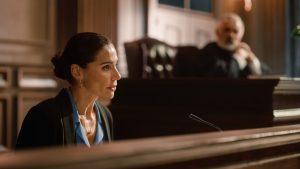Oklahoma Bar Journal
Take Five, But Civilly: A Civil Litigator's Primer on the Fifth Amendment
By Andrew J. Hofland and Justin A. Lollman

Gorodenkoff | #462414221 | stock.adobe.com
For many civil practitioners, the world of criminal law can be strange and intimidating. Different rules, different issues, different clients, different stakes. But even for litigators with an entirely civil practice, criminal law issues can and do arise. Nowhere is this more common than with issues concerning the Fifth Amendment. So what are you, the civil practitioner, supposed to do when in the lead-up to your client’s deposition, you realize the responses to the other side’s questions might incriminate your client? How does your client invoke the privilege? What are the pros and cons of doing so? Who decides whether your client’s invocation of the privilege is justified? What standard applies in making that determination? And what are the potential strategies for navigating these issues while minimizing the potential risk for your client, both civilly and criminally?
This article aims to answer these and other frequently asked Fifth Amendment questions, providing civil litigators with a brief primer on the Fifth Amendment privilege and the rules governing its invocation in civil cases.
DOES THE FIFTH AMENDMENT APPLY IN CIVIL CASES?
Yes. Although the Fifth Amendment to the U.S. Constitution states, “No person … shall be compelled in any criminal case to be a witness against himself,”[1] the Supreme Court has held that the right against self-incrimination may “be asserted in any proceeding, civil or criminal, administrative or judicial, investigatory or adjudicatory.”[2] This is, in part, because the privilege “not only extends to answers that would in themselves support a conviction under a federal criminal statute but likewise embraces those which could furnish a link in the chain of evidence needed to prosecute the claimant for a crime.”[3] Otherwise, compelled testimony, regardless of the forum, would let the genie out of the bottle, leaving the witness exposed to future criminal prosecution. So whenever “the witness has reasonable cause to apprehend danger from a direct answer” – irrespective of whether criminal charges are pending – a person can invoke the Fifth.[4]
WHEN AND HOW DOES A WITNESS INVOKE THE PRIVILEGE IN A CIVIL CASE?
Unlike in a criminal context, where a person may make a blanket assertion, in a civil context, the Fifth Amendment privilege must be invoked on a question-by-question basis.[5] In addition to avoiding potentially incriminating statements at trial or deposition, the privilege is also routinely invoked earlier in civil litigation during written discovery.[6] Not only does the privilege apply to interrogatories and requests for admission,[7] but the privilege can apply to document production as well. When “the act of producing documents … [has] a compelled testimony aspect” by implicitly communicating statements of fact – including, for example, admitting “that the papers existed, were in his possession or control, and were authentic”[8] – the Fifth Amendment protection is available. The requirement to assert the privilege over particular questions or discovery requests facilitates the ability to review, on a question-by-question basis, whether the Fifth Amendment is properly invoked.[9]
WHO DETERMINES WHETHER THE INVOCATION IS JUSTIFIED?
Ultimately, the judge decides whether the witness properly invokes the right – or, in other words, that the witness is facing a “real and appreciable” threat of criminal liability.[10] But if “it clearly appears to the court that he is mistaken[,]” the judge may require the witness to testify.[11] A witness’s “say-so does not of itself establish the hazard of incrimination.”[12] In some instances, it’s “evident from the implications of the question, in the setting in which it is asked, that a responsive answer to the question … might be dangerous because injurious disclosure could result[,]” and a judge needs nothing further.[13] In nonobvious cases, it’s incumbent on the invoking party to explain why they fear criminal liability.[14] Because detailing their concern in open court may lead to forfeiting the very protections they seek to invoke, courts often hear about the potentially incriminating nature of the testimony in camera.[15] Once a “court determines that the answers requested would tend to incriminate the witness, it should not attempt to speculate whether the witness will in fact be prosecuted.”[16] The legitimate possibility of charges is enough to sustain the privilege “absent clear evidence of an absolute bar to prosecution.”[17]
WHEN IS THE FEAR OF CRIMINAL LIABILITY UNFOUNDED, RENDERING THE PRIVILEGE UNAVAILABLE?
When the prosecution is barred, often because of the statute of limitations or immunity. A witness does not face a “real and appreciable” threat of prosecution when prosecutors are categorically prohibited from bringing charges. Even though a witness may wish to protect their privacy and not be exposed to potential disgrace or disrepute, they may be compelled to answer the question at issue if prosecution is legally impossible.[18]
Conduct that predates the pertinent statute of limitations is typically fair game and not privileged under the Fifth Amendment.[19] But the analysis of what is beyond the statute of limitations may not be so simple. The witness may properly invoke the privilege if the potentially incriminating testimony concerns conduct that may fall under a longer statute of limitations, either because of a creative charging decision or the jurisdiction.[20]
The fear of prosecution is also not well-founded if the witness is granted immunity.[21] Use immunity (or “use and fruits” immunity) under 18 U.S.C. §6001 et seq. removes the potential for criminal liability – whether in federal or state court and whether the potential use is direct or derivative.[22] It is considered “coextensive” with the scope of the Fifth Amendment privilege, allowing the witness to be compelled to testify once granted.[23] But “use” immunity does not guarantee that the witness will not be prosecuted for the underlying conduct – it’s not “transactional immunity.” The government may still prosecute the witness if it can prove that its evidence “was derived from legitimate sources wholly independent.”[24]
CAN A WITNESS INADVERTENTLY WAIVE THE PRIVILEGE?
Yes. Once a witness provides testimony on a particular subject matter, they may be precluded from asserting the privilege over other testimony within the same area.[25] Because the Fifth Amendment seeks to protect the witness, once the witness opts to voluntarily waive their privilege of silence and make a materially incriminating statement, the cat’s out of the bag.[26] Under Oklahoma law, however, disclosure does not waive the privilege if it was erroneously compelled or “made without the opportunity to claim the privilege.”[27] In any event, when a witness intends on invoking the Fifth over a matter, due care should be taken to avoid answering any substantive questions that might have an arguable nexus, however attenuated, to the matter.
DOES WAIVER OF THE PRIVILEGE IN ONE PROCEEDING WAIVE THE PRIVILEGE IN FUTURE PROCEEDINGS?
No. “It is settled that a waiver of the Fifth Amendment privilege is limited to the particular proceeding in which the waiver occurs.”[28] Thus, a witness who waives their privilege in one proceeding is not estopped from asserting “the privilege as to the same matter in a subsequent trial or proceeding.”[29] But crucially, this limitation does not bar the government from later using an individual’s statements or testimony from one proceeding against them in a subsequent criminal prosecution.[30]
CAN THE PRIVILEGE BE WITHDRAWN?
Maybe. Allowing a witness to withdraw their previous invocation of the privilege is a fact- and circumstance-dependent determination left to the discretion of the judge.[31] Generally, courts should be “especially inclined” to permit withdrawal of the privilege, so long as “there are no grounds for believing that opposing parties suffered undue prejudice.”[32] But litigants trying to “abuse, manipulate or gain an unfair strategic advantage over opposing parties” can find their request to withdraw the invocation denied.[33] This most often occurs when a party invokes the privilege during discovery only to later withdraw the privilege to submit a declaration in support of or opposition to a motion for summary judgment or to testify at trial.[34] In such cases, the later declaration is often stricken or new testimony precluded.[35]

bnenin | #249073129 | stock.adobe.com
WHAT ARE THE CONSEQUENCES OF INVOKING THE FIFTH IN A CIVIL CASE?
A party may refuse to reveal information by invoking the privilege, but that party “may have to accept certain bad consequences that flow from that action.”[36] First, the invocation itself is generally considered admissible against the invoking party, no matter if it occurs at the deposition or trial.[37] That the witness remained silent in the face of an accusation is considered “evidence of the most persuasive character.”[38] Not only is it proper for evidence of the invocation to be admitted and for the opposing party to comment on the invocation,[39] but the factfinder may draw an adverse inference that the answer to the question would have been unfavorable to the invoking party.[40] In some cases, the adverse inference may be drawn against a party even when a nonparty takes the Fifth.[41] In the most extreme cases, courts may resort to dismissal.[42] Suffice it to say, the repercussions for invoking the privilege against self-incrimination in a civil case may negatively affect the invoking party’s chances at a favorable outcome in that matter.
WILL THE COURT STAY THE CIVIL ACTION TO AVOID THE WITNESS’S HOBSON’S CHOICE?
Maybe. Generally, a court has the discretion to stay a civil case pending resolution of a related criminal action.[43] But one is not required, absent substantial prejudice to a party’s rights.[44] Courts often consider the following six factors when determining whether to stay the civil proceeding: 1) the extent to which the issues in the criminal case overlap with the issues in the civil case, 2) the status of the case, including whether the defendant has been indicted, 3) the private interests of the other party in proceeding expeditiously versus the prejudice to the plaintiff caused by the delay, 4) the private interests of and burden on the defendant, 5) the interests of the court and 6) the public interest.[45] Some of the key concerns for the invoking party include potential self-incrimination, the advantages the prosecution might enjoy with expanded discovery under the civil rules and that the criminal defense strategy might be exposed before the criminal trial.[46] Depending on how the court evaluates the factors, it might stay the case – more often when charges are already pending – or it might deny the stay, leaving the witness to choose between silence and an adverse inference versus potential self-incrimination.
Should the court not wish to afford the defendant a stay to resolve their criminal matter, there are other measures it may take to mitigate as much of the harm as possible. In general, courts attempt to permit as much discovery as possible while still protecting a person’s Fifth Amendment rights.[47] If countervailing interests prevail over the defendant’s request, less drastic methods – such as “sealing answers to interrogatories, sealing answers to depositions, imposing protective orders, imposing a stay for a finite period of time, limiting a stay to a particular subject or limiting disclosure only to counsel” – may be appropriate.[48]
CAN CORPORATIONS INVOKE IT?
No. The privilege is a personal one, not available to business entities. Corporations,[49] limited liability companies,[50] partnerships[51] and labor unions[52] cannot invoke the Fifth. But a sole proprietorship, as an extension of the person, can.[53] The relationship between individuals and the corporate party may have special implications under Fifth Amendment case law. For instance, a corporate document custodian cannot invoke the Fifth because they hold the records in a representative capacity for the corporation, not individually. Even though disclosing the records might incriminate them personally, they cannot avoid the production of corporate records on Fifth Amendment grounds.[54] And as noted above, the invocation of the privilege by nonparty employees – whether past or present – could create an adverse inference against the employer-defendant.[55] The universe of potentially complex relationships and their corresponding effects on a corporate defendant is worthy of extra attention going into discovery or trial.
CONCLUSION
When deprivation of one’s liberty is a possibility, the stakes are high. Staying vigilant over the ways in which a response or answer in a civil case may affect a current or future criminal case is paramount. Specialized knowledge of the federal or state criminal code is not required. But having a sense of where the potential issues are and how they’re likely going to come up will help prevent a misstep with serious ramifications.
ABOUT THE AUTHORS
 Andrew J. Hofland is a shareholder at GableGotwals, where his practice focuses on white-collar defense and commercial litigation. He previously served as an assistant U.S. attorney for the Northern District of Oklahoma and a Navy judge advocate.
Andrew J. Hofland is a shareholder at GableGotwals, where his practice focuses on white-collar defense and commercial litigation. He previously served as an assistant U.S. attorney for the Northern District of Oklahoma and a Navy judge advocate.
 Justin A. Lollman is a shareholder at GableGotwals, where his practice focuses on appeals, complex commercial litigation and white-collar criminal defense. Before entering private practice, Mr. Lollman clerked on the U.S. Court of Appeals for the 7th Circuit and the U.S. District Court for the Northern District of Oklahoma.
Justin A. Lollman is a shareholder at GableGotwals, where his practice focuses on appeals, complex commercial litigation and white-collar criminal defense. Before entering private practice, Mr. Lollman clerked on the U.S. Court of Appeals for the 7th Circuit and the U.S. District Court for the Northern District of Oklahoma.
ENDNOTES
[1] U.S. Const. Amend V (emphasis added).
[2] Kastigar v. United States, 406 U.S. 441, 445 (1972); see also McCarthy v. Arndstein, 266 U.S. 34, 40 (1924) (holding the nature of the proceeding is not determinative but rather “wherever the answer might tend to subject to criminal responsibility him who gives it”); Lefkowitz v. Turley, 414 U.S. 70, 77 (1973) (explaining that the Fifth Amendment permits an individual “not to answer official questions put to him in any proceeding, civil or criminal, formal or informal, where the answers might incriminate him”).
[3] Hoffman v. United States, 341 U.S. 479, 486-487 (1951).
[4]Id. At 486 (citing Mason v. United States, 244 U.S. 362, 365 (1917)); State ex rel. Oklahoma Bar Ass’n v. Moss, 1990 OK 22, 794 P.2d 403, 410 n. 6 (citations omitted) (the danger of incrimination must be “substantial and real, and not merely trifling or imaginary”).
[5] United States v. Schmidt, 816 F.2d 1477, 1481-82 (10th Cir. 1987); United States v. Jones, 703 F.2d 473, 477 (10th Cir. 1983).
[6] See, e.g., Davis-Lynch v. Moreno, 667 F.3d 539, 547 (5th Cir. 2012).
[7] See Omni Air Int'l, LLC v. Austin Technik 1, Inc., 2018 WL 1740936, at *5 (N.D. Okla. April 11, 2018) (permitting a party to plead the Fifth Amendment in response to a request for admission); Helena Chem. Co. v. Skinner, No. 4:11CV00691 SWW, 2012 WL 3860604, at *2 (E.D. Ark. Sept. 5, 2012) (holding party was justified in pleading the Fifth in response to request for admission, notwithstanding Rule 36(b)’s limitation that a party’s answer to a request for admission “cannot be used against the party in any other proceeding”). But see Ledet v. Perry Homes, 2022 WL 831809, at *1 n.1 (5th Cir. March 21, 2022) (“[R]equests for admissions responses cannot be used against defendants in criminal proceedings, so the Fifth Amendment is not a defense to the requests.” (citing Fed. R. Civ. P. 36(b))).
[8] United States v. Hubbell, 530 U.S. 27, 36 (2000). Although the privilege may not be properly invoked over the production of nontestimonial evidence or evidence that is a “byproduct of obedience to a regulatory requirement, such as filing an income tax return, maintaining required records or reporting an accident.” Id. at 35.
[9] Schmidt, 816 F.2d at 1482.
[10] Hiibel v. Sixth Jud. Dist. Ct. of Nevada, Humboldt Cnty., 542 U.S. 177, 190 (2004).
[11] Hoffman, 341 U.S. at 486 (quoting Temple v. Commonwealth, 75 Va. 892, 899 (1881)).
[12] Hoffman, 341 U.S. at 486.
[13] Id. at 486-87.
[14] Id.
[15] See, e.g., S.E.C. v. Farmer, 560 Fed. Appx. 324, 326-27 (5th Cir. 2014) (discussing the procedure a court should undertake to receive evidence on the potentially incriminating nature of the testimony).
[16] United States v. Jones, 703 F.2d 473, 478 (10th Cir. 1983).
[17] United States v. Nipper, 210 F.Supp.2d 1259, 1262 (N.D. Okla. 2002).
[18] Brown v. Walker, 161 U.S. 591, 597-98 (1896).
[19] Frierson v. Woodford, 463 F.3d 982, 987 n.5 (9th Cir. 2006).
[20] See Robert Heidt, The Conjurer’s Circle-the Fifth Amendment Privilege in Civil Cases, 91 Yale L.J. 1062, 1078–80 (1982).
[21] Kastigar, 406 U.S. at 460.
[22] 18 U.S.C. §6002 (“no testimony or other information compelled under the order [compelling testimony under use immunity] (or any information directly or indirectly derived from such testimony or other information) may be used against the witness in any criminal case.”); Hubbell, 530 U.S. at 45.
[23] Hubbell, 530 U.S. at 45; Kastigar, 406 U.S. at 453.
[24] Hubbell, 530 U.S. at 40.
[25] See, e.g., Rogers v. United States, 340 U.S. 367, 373 (1951) (“Disclosure of a fact waives the privilege as to details. ... ‘Thus, if the witness himself elects to waive his privilege ... and discloses his criminal connections, he is not permitted to stop, but must go on and make a full disclosure.’” (quoting Brown, 161 U.S. at 597)); Mitchell v. United States, 526 U.S. 314, 321 (1999) (after witness waives for “matters to which the witness testifies,[ ] the scope of the waiver is determined by the scope of the relevant cross-examination.”).
[26] Id. See also 12 O.S. §2511 (the witness “waives the privilege if the person or the person’s predecessor voluntarily discloses or consents to disclosure of any significant part of the privileged matter.”).
[27] 12 O.S. §2512.
[28] United States v. Rivas-Macias, 537 F.3d 1271, 1280 & n.14 (10th Cir. 2008) (quoting United States v. Licavoli, 604 F.2d 613, 623 (9th Cir. 1979)).
[29] Id. (quoting United States v. Yurasovich, 580 F.2d 1212, 1220 (3d Cir. 1978)).
[30] Harvey v. Shillinger, 76 F.3d 1528, 1535-36 (10th Cir. 1996).
[31] S.E.C. v. Smart, 678 F.3d 850, 855 (10th Cir. 2012).
[32] Id.
[33] Id.
[34] Id. (citing Davis-Lynch, Inc. v. Moreno, 667 F.3d 539, 547-48 (5th Cir. 2012) (post-discovery change of heart often places opposing party “at a significant disadvantage because of increased costs, delays, and the need for a new investigation.”)).
[35] See United States v. $148,840.00 in U.S. Currency, 521 F.3d 1268, 1277 (10th Cir. 2008) (“It is well established that in a civil case a district court may strike conclusory testimony if the witness asserts the Fifth Amendment privilege to avoid answering relevant questions, yet freely responds to questions that are advantageous to his cause.”); see, e.g., Nationwide Life Ins. Co. v. Richards, 541 F.3d 903 (9th Cir. 2008) (victim’s wife precluded from testifying at criminal trial of another about her involvement or lack thereof in her husband’s murder after asserting Fifth Amendment privilege in response to questions about involvement at deposition in civil suit); Smart, 678 F.3d at 854-56 (affirming order striking defendant’s summary judgment declaration where defendant invoked the Fifth Amendment during discovery and “did not attempt to withdraw his assertion of the Fifth Amendment until after the [the plaintiff] had moved for summary judgment and the discovery cut-off date had expired.”).
[36] Mid-Am.'s Process Serv. v. Ellison, 767 F.2d 684, 686 (10th Cir. 1985).
[37] See, e.g., F.D.I.C. v. Fidelity & Deposit Co. of Maryland, 45 F.3d 969 (5th Cir. 1995).
[38] U.S. ex rel. Bilokumsky v. Tod, 263 U.S. 149, 153–54 (1923).
[39] Matter of C.C., 1995 OK CIV APP 127, ¶11, 907 P.2d 241, 244; but see 12 O.S. §2513 (“[a] claim of privilege, whether in the present proceeding or upon a prior occasion, is not a proper subject of comment by judge or counsel. No inference may be drawn therefrom.”).
[40] Baxter v. Palmiginano, 425 U.S. 308, 318 (1976); but see United States v. 15 Black Ledge Drive, 897 F.2d 97, 103 (2d Cir. 1990) (adverse inference instruction in civil forfeiture cases poses “a troubling question, given the severity of the deprivation at risk”).
[41] See LiButti v. United States, 107 F.3d 110 (2d Cir. 1997) (establishing the widely used factors to guide whether courts draw an adverse inference from a nonparty’s invocation, including “1) the nature of the relevant relationship, 2) the degree of control of the party over the non-party witness, 3) the compatibility of the interest of the party and the non-party witness in the outcome of the litigation, and 4) the role of the non-party witness in the litigation.”); Fidelity & Deposit Co. of Maryland, 45 F.3d at 969 (5th Cir. 1995) (instruction against defendant appropriate even though nonparty investor had no special relationship to defendant-fidelity bond insurer).
[42] See, e.g., Serafino v. Hasbro, Inc., 82 F.3d 515, 519 (1st Cir. 1996) (dismissal appropriate because evidence was sought was “central” to defendant’s defense, there was “no effective substitute” for plaintiff’s answers and “no adequate alternative remedy”); Wehling v. Columbia Broadcasting Sys., 608 F.2d 1084, 1087 n. 6 (5th Cir. 1979) (dismissal may be an appropriate remedy of “last resort”); Lyons v. Johnson, 415 F.2d 540, 542 (9th Cir. 1969) (use of privilege as a shield and sword may “create an imbalance in the pans of the scales,” requiring dismissal).
[43] United States v. Kordel, 391 U.S. 1, 12 n. 27 (1970); State ex rel. Oklahoma Bar Ass’n v. Gasaway, 1993 OK 13, ¶18, 863 P.2d 1189, 1197 (acknowledging that “a court may exercise its discretion and grant a stay when a strong public interest in proceeding expeditiously on a civil case is absent.”).
[44] Creative Consumer Concepts, Inc. v. Kreisler, 563 F.3d 1070, 1080 (10th Cir. 2009).
[45] In re CFS-Related Sec. Fraud Litig., 256 F. Supp. 2d 1227, 1236-37 (N.D. Okla. 2003).
[46] S.E.C. v. Dresser Indus., Inc., 628 F.2d 1368, 1375 (D.C. Cir. 1980).
[47] See United States v. Certain Real Prop. and Premises Known as 4003-4005 5th Ave., Brooklyn, New York, 55 F.3d 78, 84 (2d Cir. 1995).
[48] CFS, 256 F. Supp. 2d at 1236.
[49] Hale v. Henkel, 201 U.S. 43, 74-75 (1906).
[50] United States v. Roe, 421 Fed. App’x 881, 883 (10th Cir. 2011).
[51] Bellis v. United States, 417 U.S. 85, 95-96 (1974).
[52] United States v. White, 322 U.S. 694, 701 (1944).
[53] Braswell v. United States, 487 U.S. 99, 101 (1988).
[54] Id. at 113.
[55] LiButti, 107 F.3d at 123-124.
